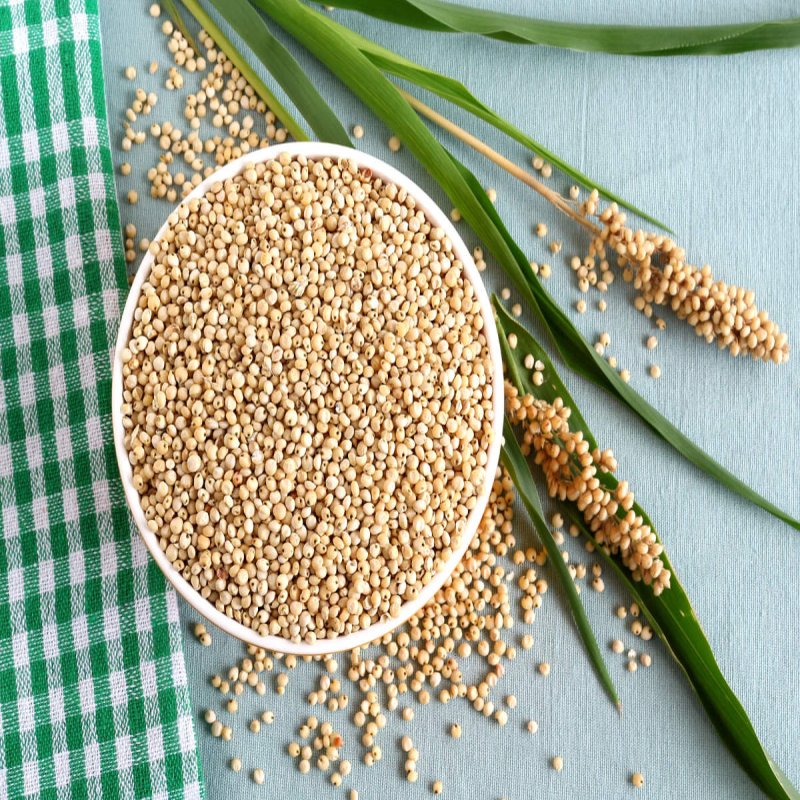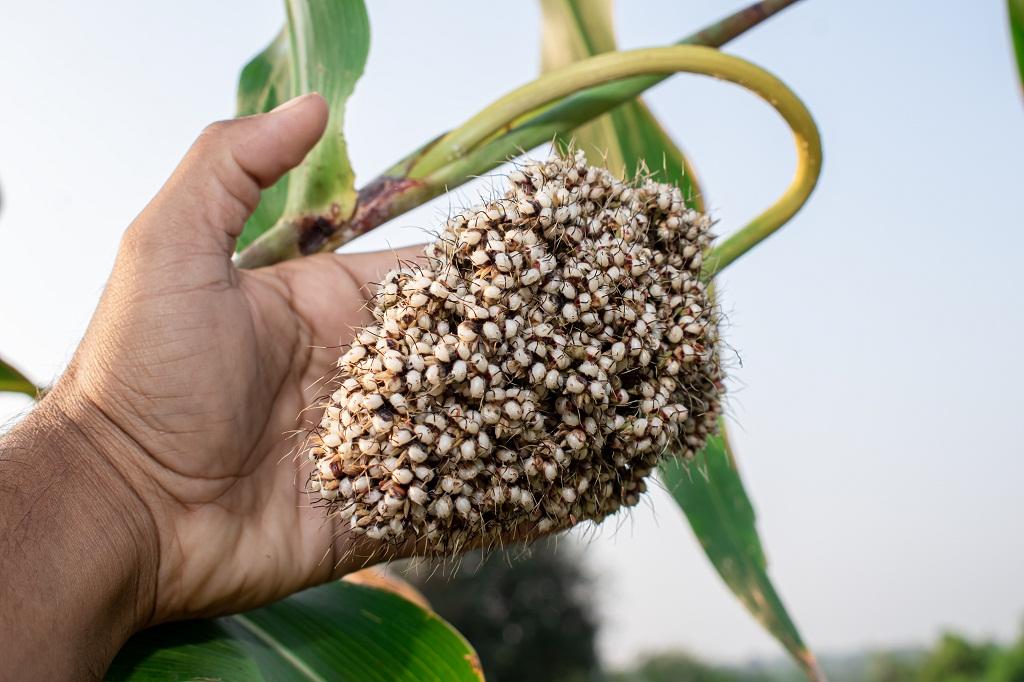
Our obsession with all-purpose flour, or Maida, is a cause for concern amongst health experts across the country. There is no doubt that piping hot pooris and bhaturas are delicious, but maida is processed, refined, and bleached wheat flour and is associated with many health problems, including weight gain and constipation. Luckily, there are some healthy and equally tasty grains out there as alternatives to maida and all-purpose flour. One such millet is Jowar or Sorghum.
Jowar or sorghum is a broad term for an entire genus of grasses that are native to tropical and subtropical regions around the world. Amongst 30 different species of sorghum, only one is harvested for human consumption, while the others are primarily used as fodder for animals.

Sorghum bicolor, the fifth most important cereal crop in the world, is native to Africa but now grows all around the world as a staple food. Jowar is primarily used in the production of sorghum molasses, and sorghum syrup and also as a grain. It also helps in producing alcoholic beverages and even biofuels.
Did You Know?
Sorghum is a very important source of food for cattle and poultry around the world.
Red-colored pigment extracted from sorghum is used for leather painting in Africa.
The stem of sorghum can be used to manufacture baskets.
Broomcorn is a type of sorghum used for manufacturing brooms.
Sorghum grains are used to produce ethanol for biofuel.
Jowar is very nutritious when included in the diet. It provides vitamins like niacin, riboflavin, and thiamin, as well as high levels of calcium, phosphorous, magnesium, iron, copper, potassium, protein, and a very significant amount of dietary fiber (48% of the recommended intake).
Health Benefits of Jowar
Some notable health benefits of jowar include its ability to prevent certain types of cancer, build strong bones, help control diabetes, and improve digestive health. It offers a dietary option to people with celiac disease, promotes red blood cell development, and boosts fuel and energy production.
Let’s delve deeper into understanding the health benefits of jowar.
Prevents Cancer
Sorghum grains contain important antioxidants that neutralize and eliminate free radicals in the body. These antioxidants reduce the risk of various types of cancer, including esophageal cancer, particularly in comparison to people who eat wheat and corn regularly.

Maintains Bone Health
This is one of the major health benefits of jowar. The high magnesium content of sorghum helps maintain calcium levels as it increases calcium absorption in the body. These minerals speed up the healing of damaged or aging bones and also help in bone tissue development. It prevents conditions like osteoporosis and arthritis, hence keeping you healthy and active in your old age.

Manages Diabetes
Excessive carbohydrates break down into simple sugars which increase the glucose levels in the body causing diabetes. However, the tannin-rich bran of sorghum actually has enzymes that inhibit the absorption of starch. It also helps regulate glucose and insulin levels in the body. This, in turn, prevents diabetic shock and other health complications occurring due to blood sugar spikes.

Promotes Digestion
One of the other major health benefits of jowar is improving digestive health. Sorghum contains some dietary fiber, which greatly improves the functionality of the digestive system. Dietary fibers keep your food moving along the digestive tract rapidly, preventing constipation, stomach aches, excess gas, cramping, bloating, and diarrhea.
The high dietary fiber content also prevents excess consumption and helps you manage your body weight. Furthermore, increased intake of fiber helps to eliminate dangerous cholesterol (LDL), improving heart health and protecting your body from conditions like atherosclerosis, heart attack, and stroke.

Relieves Gluten Allergy
Celiac disease is a severe allergy to gluten. Surprisingly, wheat/gluten is present in thousands of normal food items, which makes life difficult for those suffering from celiac disease. Fortunately, people suffering from this common condition can safely consume alternative grains and grasses, such as sorghum, preventing symptoms like nausea, painful inflammation, and gastrointestinal damage that gluten causes.

Read more about gluten intolerance here!
Treats Anaemia
Copper and iron are also present in sorghum. Copper increases the absorption of iron into the body thereby reducing the risk of anaemia. These minerals boost red blood cell development, improving blood circulation, stimulating cellular growth and repair, and increasing hair growth, while also enhancing the energy levels in the body.

How to Include Jowar in your Diet?
You can easily incorporate jowar into your daily diet through rotis. You can pair it with other cereals and pulses. Additionally, you can use it to make porridge, dosas, and idlis. You can also make jowar cupcakes by substituting the refined flour in any cupcake recipe with 50% jowar flour and 50% wheat.
Jowar is slightly denser in comparison to whole wheat, so you may need some time to adjust to the taste and texture in the beginning. However, including it in your diet is the best way to increase the nutritional quotient of your diet.

You can boil or steam the grains to make porridge and soup. Alternatively, you can also grind the grain into flour to prepare a number of dishes. Unlike wheat flour, it lacks elasticity. So while making rotis, one often uses the palm to give them shape before tossing them onto the hot tawa. You can also mix it with other flours to make pooris, khakra, thalipeeth (Maharashtrian spiced pancakes), muthias (Gujarati steamed dumplings), paranthas, and even bread, cakes, and cookies.
Now you know quite a lot about the nutritional qualities and health benefits of jowar. So, try some and tell us about your experiences in the comments below!
Disclaimer: There are no known concerns or cautions against incorporating sorghum to your diet. Some people may be allergic to it, but the cases of sorghum being allergenic are very rare.
Nutritional Information
100g of Jowar provides 329 Calories, Carbs – 72g (Dietary Fibre – 6.7g, Sugar – 2.5g), Protein – 1.1g, Fat – 3.5g (saturated fat – 0.6g), Sodium – 2mg
And a percentage daily value of Vitamin A – 0%, Vitamin C – 0%, Iron – 19%, Calcium – 1% (based on a 2000-calorie diet).


.png)


